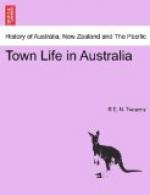and the Oriental are most to be recommended; after
these try the United Club Hotel, or, if you be a bachelor,
Scott’s. The hotels, I think without exception,
derive their chief income from the bar traffic, with
which, at all but the few I have mentioned, you cannot
help being brought more or less into contact.
Lodgers are quite a secondary consideration. This
is very disagreeable for ladies. The best hotels,
moreover, have no
table d’hote—only
the old-fashioned coffee and commercial rooms; so
that if you are travelling
en famille you have
no choice but to have your meals in a private sitting-room.
For a bachelor, who is not particular so long as his
rooms are clean, and can put up with plain fare, there
need, however, be no difficulty in getting accommodation;
but anyone who wishes to be comfortable had better
live at the clubs, which in every one of the ‘capitals’
are most liberal in their hospitality, and have bedrooms
on their premises. Visitors to the colony are
made honorary members for a month on the introduction
of any two members, and the term is extended to six
months on the small subscription of a guinea a month.
The Melbourne Club is the best appointed in the Colonies.
The rooms are comfortable, and decently though by
no means luxuriously furnished, and a very fair table
is kept. The servants wear full livery. There
is a small library, all the usual appurtenances of
a London club, and a racquet-court. The other
clubs, though less pretentious, are all comfortable.
Your colonial rarely walks a step farther than he
can help, and of course laziness is well provided
with cabs and omnibuses. You can take your choice
between one-horse waggonettes and hansoms, though a
suspicion of Bohemia still lingers about the latter.
Happily Mrs. Grundy has never introduced ‘growlers.’
The waggonettes are light boxes on wheels, covered
in with oil-cloth, which can be rolled up in a few
seconds if the weather is fine or warm. It is
strange that victorias like those in Paris have never
been tried in this warm climate. A few years ago
Irish jaunting-cars and a jolting vehicle called a
‘jingle’ were much used, but they have
slipped out of favour of late, and are now almost obsolete.
The fares are usually moderate, ranging from a shilling
for a quarter of an hour to the same coin for the
first mile, and sixpence for every subsequent one.
Cabby is fairly civil, but, as at home, always expects
more than his legal fare.
Nowhere do omnibuses drive a more thriving trade than
in Melbourne, and they deserve it, for they are fast,
clean, roomy, and well managed. The price of
labour makes conductors too expensive a luxury, and
passengers have to put their fare—in most
cases threepence—into a little glass box
close to the driver’s seat. This unfortunate
man, in addition to looking after the horses, and
opening and shutting the door by means of a strap
tied to his foot, which you pull when you want to get
out, has to give change whenever a little bell is




